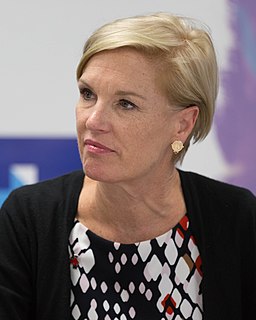A Quote by Ruth Simmons
When we conducted focus group interviews in the first municipality in Brazil before initiating the pilot project, a woman commented: Getting an appointment in the public sector municipal health services is like "winning the lottery." I would like to make it possible for many women and men in Latin America to win the lottery and receive the type of reproductive health services they so urgently need.
Quote Topics
America
Appointment
Before
Brazil
First
Focus
Getting
Group
Health
Health Services
Interviews
Latin
Latin America
Like
Lottery
Make
Many
Men
Municipal
Municipality
Need
Pilot
Possible
Project
Public
Public Sector
Receive
Reproductive
Reproductive Health
Sector
Services
Type
Win
Winning
Winning The Lottery
Woman
Women
Women And Men
Would
Related Quotes
We also need to make sure women can be in charge of their reproductive health. We can't defund places like Planned Parenthood, where women can go for all kinds of healthcare services. While reproductive rights span much further than the pro-life/pro-choice debate, Donald Trump has actually said he wants to "punish" women for having abortions. And Mike Pence is quite possibly the most anti-choice vice presidential candidate in history.
If instead policy makers and program managers participate in an interdisciplinary assessment team, make informal visits to local families and have in-depth conversations with local providers and health authorities, the real needs and complex challenges of organizing good reproductive health services become apparent.The first country that implemented this participatory program of assessment, research and policy development was Brazil. I was one of the outsiders who provided support to the initiative.
In addition to being an economic security issue, the failure to pay women a salary that's equal to men for equal work is also a women's health issue. The fact is that the salary women are paid directly impacts the type of health care services they are able to access for both themselves and their families.
At Planned Parenthood, we see the impact of abortion stigma firsthand, in the women who delay getting reproductive health care because they fear they’ll be labeled and judged. We see the effect of stigma on doctors, health center staffers, and others who help provide abortion services. And we see the impact in laws that regulate and restrict abortion in ways that would never happen with any other medical procedure.
And under the existing circumstances, I understand there are situations where people indeed need care and need services, but I believe in America that the majority of those people are getting those services under situations and circumstances that are afforded to them by their health care providers and their state government.

































